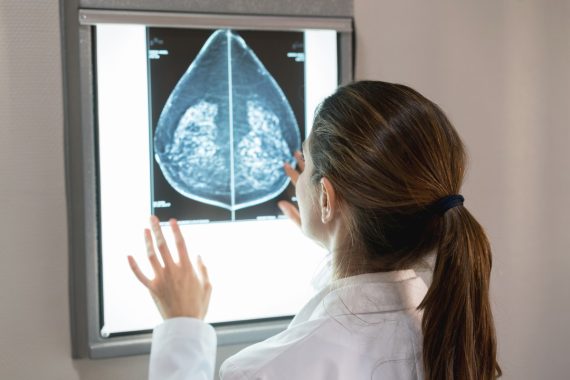Women with dense breasts ‘should have additional cancer screening tests’

Additional scans on top of mammography can detect more cases of breast cancer when offered to women with very dense breast tissue, a UK trial has reported.
A trial of more than 9,000 women at 10 sites found that extra imaging done with abbreviated MRI or contrast-enhanced mammography picked up cancers that had not been detected with standard mammogram.
If the approach was adopted on the NHS, the extra scans could treble cancer detection potentially saving up to 700 lives a year in the UK, the researchers at the University of Cambridge reported in The Lancet.
Around 10% of women have very dense breasts as shown by mammogram. Between the ages of 50 and 70, they are up to four-times more likely to develop breast cancer compared to women with low breast density.
Per 1,000 women screened, the two scanning methods detected 17-19 cancers that were not seen in mammograms. Adding either of them to existing screening programmes could detect 3,500 more cancers a year, the team calculated.
A third method – automated whole breast ultrasound – did pick up more cases than mammography alone but was not as effective as abbreviated MRI or contrast-enhanced mammography.
It is the first trial to directly compare supplemental imaging methods and to investigate their value for early cancer detection as part of widespread screening.
But further research is needed to confirm whether picking up extra cases of cancer through the additional scans leads to a reduction in the number of deaths.
Study lead Professor Fiona Gilbert, honorary consultant radiologist at Addenbrooke’s Hospital in Cambridge, said: ‘Getting a cancer diagnosis early makes a huge difference for patients in terms of their treatment and outlook.
‘We need to change our national screening programme so we can make sure more cancers are diagnosed early, giving many more women a much better chance of survival.’
Professor Stephen Duffy, emeritus professor at Queen Mary University, London, trial statistician said: ‘The NHS Breast Screening Programme has made a huge difference to many lives. Thanks to these results we can see that the technology exists to make screening even better, particularly for the 10% of women with dense breast tissue.’
Dr David Crosby, head of prevention and early detection at Cancer Research UK, said: ‘This study shows that making blood vessels more visible during mammograms could make it much easier for doctors to spot signs of cancer in women with dense breasts.
‘More research is needed to fully understand the effectiveness of these techniques, but these results are encouraging.’
Portfolio careers
What is the right portfolio career for you?

Visit Pulse Reference for details on 140 symptoms, including easily searchable symptoms and categories, offering you a free platform to check symptoms and receive potential diagnoses during consultations.













